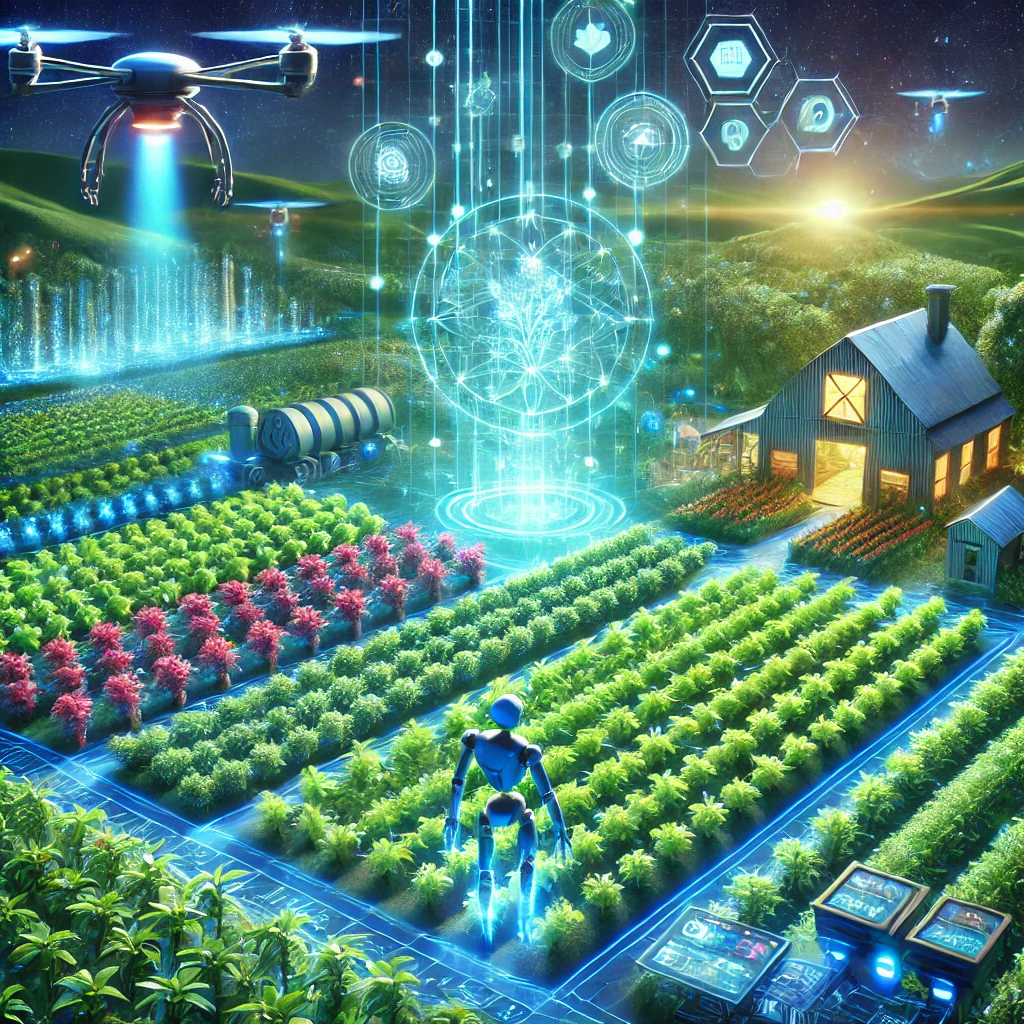Agriculture, a cornerstone of human civilization, is undergoing a profound transformation, and d.Farm is leading the way. This innovative digital platform combines technology, data, and agriculture to create a new paradigm for farming—one that is smarter, more sustainable, and better equipped to meet the challenges of today’s world. With the increasing pressures of climate change, growing population, and the need for sustainable food production, d.farm leverages cutting-edge technologies like machine learning, data analytics, and IoT (Internet of Things) sensors to optimize farming practices and ensure greater efficiency on the farm.
From small family-owned farms to large-scale industrial operations, d.farm offers transformative solutions that have the potential to reshape the future of farming.
Understanding d.farm: The Digital Farming Revolution
At its core, d.farm is a data-driven digital farming platform designed to help farmers make better, more informed decisions. By using real-time data, the platform allows farmers to monitor everything from soil health to pest infestations, giving them insights into the vital elements that affect their crops.
The key to d.farm’s success lies in its ability to process massive amounts of information and present it in a way that farmers can understand and act on quickly. Whether it’s data from IoT-enabled soil sensors, satellite imaging of field conditions, weather patterns, or crop growth cycles, d.farm connects all this information into one comprehensive platform. This empowers farmers to make decisions based on precise data rather than trial and error or guesswork, increasing efficiency and reducing the risk of crop failure or unnecessary resource use.
How d.farm Optimizes Farming Efficiency
Precision Agriculture is one of the standout features of d.farm. Gone are the days when farmers had to apply water, fertilizers, or pesticides to entire fields without considering the varying needs of different sections. With d.farm, precision agriculture enables farmers to apply inputs only where and when they are needed, reducing waste and increasing crop productivity.
For example, d.farm’s IoT sensors continuously measure moisture levels in the soil, while its satellite-based system predicts weather patterns in real-time. This data allows farmers to control irrigation more accurately, ensuring that plants receive the optimal amount of water, and prevents unnecessary water waste.
Additionally, d.farm helps optimize fertilizer use. By analyzing soil conditions, crop types, and nutrient needs, the platform provides farmers with actionable insights into where fertilizer is most needed and how much should be applied. This not only reduces costs for farmers but also minimizes the environmental impacts of overfertilization, which can lead to runoff and contamination.
Real-Time Monitoring for Smarter Farming
IoT Sensors and Satellites: Thanks to the growing use of Internet of Things (IoT) devices and satellites, farmers now have the ability to monitor their crops in real-time. d.farm leverages these technologies to keep tabs on a variety of crucial factors, such as soil moisture, temperature, crop health, and pest activity. This continuous feedback allows farmers to quickly react to any issues as they arise, minimizing damage and maximizing productivity.
For instance, satellite imaging can spot potential crop health issues early, such as nutrient deficiencies or disease symptoms. Instead of waiting for visible signs of stress or pest outbreaks, farmers can intervene early, reducing the need for widespread pesticide applications and improving their chances of maintaining a healthy crop.
By gaining insights into plant stress, crop growth cycles, and even the effects of extreme weather, farmers are armed with the data they need to be more efficient and resilient in their farming practices. This dynamic, responsive approach provides flexibility, helping farmers adapt more quickly to changing conditions, especially as they face growing uncertainty around weather patterns due to climate change.
Sustainability: Meeting the Challenge of Feeding the Future
With the global population steadily increasing, the agricultural sector must meet higher food demands while reducing its impact on the planet. Sustainable farming practices are more critical than ever, and d.farm is playing a central role in addressing these challenges.
Water Conservation: Traditional irrigation methods often lead to the overuse of water, especially in areas experiencing drought or where water resources are limited. Through real-time moisture monitoring, d.farm ensures water is applied where it is needed, reducing excess use and conserving precious water supplies. With accurate irrigation decisions based on live soil data and weather forecasts, farmers can optimize water distribution for higher efficiency.
Reduced Chemical Inputs: Pesticides and fertilizers are essential to modern agriculture, but their overuse can have serious environmental impacts. d.farm minimizes this impact by offering precise insights on pest outbreaks, weather conditions, and crop needs. Rather than blanket spraying fields, farmers are encouraged to use pesticides and fertilizers only when and where they are necessary—ensuring cleaner ecosystems and healthier soils.
Promoting Biodiversity: Deforestation and monoculture farming have adverse effects on biodiversity, leaving ecosystems vulnerable and reducing resilience. d.farm’s ability to assess and monitor plant health promotes more holistic farming systems. By adopting data-backed strategies for crop rotation, intercropping, and resource management, farmers can encourage greater biodiversity on their farms, which supports ecosystems and improves overall farm sustainability.
Data-Driven Community: Building a Collaborative Farming Network
d.farm is also about more than just optimizing individual farms—it fosters a collaborative environment for farmers to learn from each other and adapt best practices. Through its cloud-based platform, d.farm enables farmers to access a community of experts, knowledge-sharing forums, and educational content. Users can compare strategies, share successes and challenges, and stay up-to-date with the latest agricultural technology trends.
Farmers benefit not only from technology but from the experience and knowledge of their peers worldwide. Collaborative efforts can lead to collective problem-solving, spreading innovations and solutions more rapidly across agricultural communities.
This cooperative approach provides smallholder and family-owned farmers—who may lack the resources or experience to utilize high-tech tools—with the ability to enter the digital agriculture landscape. By ensuring that data and technological resources are accessible, d.farm allows these farmers to level the playing field and compete alongside larger industrial operations.
The Future of Farming with d.farm
As the future unfolds, d.farm is positioned to become even more integral to global food systems. The platform is constantly evolving, adopting emerging technologies like artificial intelligence (AI), machine learning (ML), and blockchain for more sophisticated analysis, greater efficiency, and transparency.
AI and ML are expected to continue advancing d.farm’s predictive capabilities, providing increasingly accurate forecasts of crop yields, pest outbreaks, and resource needs. Blockchain could be integrated to enhance supply chain transparency, ensuring that food products are traceable from the farm to the consumer while assuring ethical sourcing and fair pricing for farmers.
Further integration of automation technologies may also drive down labor costs, helping farms scale more efficiently without compromising quality or sustainability. As robots and drones take on tasks like planting, harvesting, and monitoring crops, d.farm will continue to evolve as an all-in-one platform for managing the entire farming cycle.
Conclusion
d.farm exemplifies the innovative spirit that will define the future of agriculture. By embracing technology, sustainability, and data analytics, it’s creating smarter, more resilient farming practices. With the challenges of climate change and global food security, digital farming platforms like d.farm are more than just tools—they are essential for the future of global agriculture.
As technology and innovation continue to influence agricultural practices, d.Farm is paving the way for a new era where farming is not just more efficient but also more sustainable, smarter, and better equipped to meet the growing demands of the planet’s population. In this digital age, d.farm is more than an agriculture solution—it is the key to a more prosperous, resilient, and sustainable future for all.





